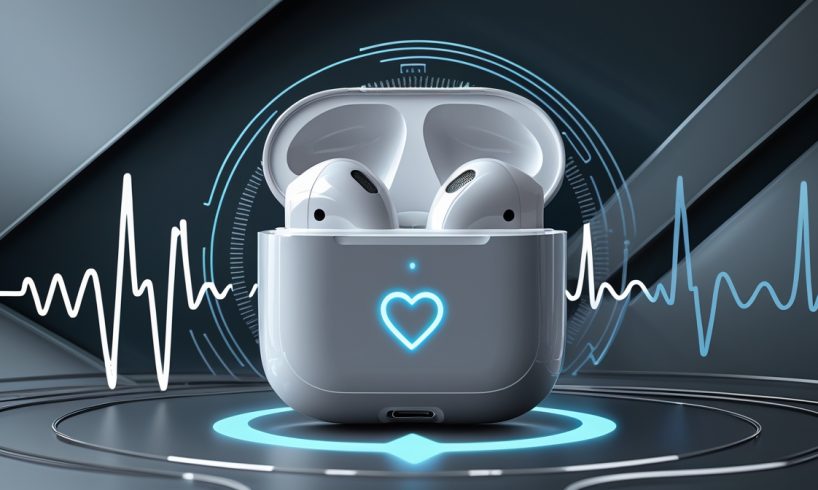
Apple is reportedly working on a major health-focused upgrade for its AirPods, aiming to turn the popular wireless earbuds into heart rate monitoring devices — powered by artificial intelligence (AI). This move signals Apple’s continued push into the health tech space, positioning AirPods as more than just a premium audio accessory, but a key piece in the company’s expanding ecosystem of biometric health tools.
According to recent reports and patent filings, Apple is exploring how to use a combination of infrared sensors, motion detection, and AI algorithms to monitor users’ heart rate and possibly other vital signs like body temperature and respiratory patterns all from the ear.
The Next Frontier for Wearables: The Ear
Smartwatches like the Apple Watch already offer robust health tracking capabilities including ECG, blood oxygen levels, and fitness tracking. However, the ear canal offers unique advantages as a location for biometric measurement. It’s rich in blood vessels and relatively stable compared to the wrist, which can introduce more noise due to movement.
By placing sensors inside the AirPods, Apple could potentially achieve more accurate and consistent readings, especially during activities like running or sleeping where wrist-based wearables may lose contact or introduce errors.
AI at the Core of the Experience
Apple’s innovation goes beyond just hardware. What sets this initiative apart is its integration of AI to analyze the biometric data collected from the AirPods. Here’s how AI could play a crucial role:
- Pattern Recognition: Machine learning models can analyze heart rate patterns over time to detect anomalies like arrhythmias or elevated stress.
- Personalized Insights: AI can adjust readings based on user-specific baselines, improving accuracy and offering tailored health recommendations.
- Contextual Awareness: By combining motion data, environmental context, and heart rate, AI can better understand what the user is doing (e.g., exercising vs. resting) and adjust alerts accordingly.
This AI-driven layer could make the AirPods a passive yet powerful health companion detecting issues long before symptoms arise.
Privacy and Health Data
As Apple collects more health data, privacy becomes an increasingly critical concern. Fortunately, the company has positioned itself as a privacy-first brand. Just like with the Apple Watch and Health app, users can expect that data collected from AI-powered AirPods would be secure, encrypted, and stored locally or in the cloud with user consent.
Apple may also expand its HealthKit and ResearchKit platforms to incorporate AirPods data, allowing researchers and health professionals to use the information for large-scale studies with user permission.
Potential Use Cases
If Apple succeeds in making AirPods reliable heart rate monitors, the possibilities extend beyond casual wellness tracking:
- Fitness Training: Accurate heart rate data could be used to optimize workouts, monitor VO2 max, and provide recovery insights.
- Stress and Sleep Monitoring: With AI analyzing heart rate variability (HRV), AirPods could help track mental well-being and sleep quality.
- Early Detection of Illness: Elevated heart rate or irregular rhythms could be flagged early, prompting users to seek medical attention.
- Remote Healthcare: AirPods could become a passive tool for doctors monitoring at-risk patients in real time.
Challenges to Overcome
Despite the potential, several challenges remain before AI-powered health monitoring via AirPods becomes mainstream:
- Battery Life: Continuous biometric monitoring could strain the tiny battery of AirPods, requiring new power efficiency strategies or battery tech.
- Sensor Accuracy: Measuring heart rate through the ear canal is promising, but must be proven reliable across diverse populations and conditions.
- Regulatory Approvals: For AirPods to function as medical-grade monitors, Apple may need to seek FDA or international regulatory clearance a lengthy and rigorous process.
- User Adoption: Not every user wants their earbuds tracking health data, so Apple will need to focus on opt-in experiences, clear consent, and privacy education.
Competition and the Wearable Market
Apple is not alone in eyeing the ear for health data. Companies like Bose and Jabra have previously dabbled in fitness-tracking earbuds, though with limited success. However, none have Apple’s ecosystem strength, software expertise, or user base to turn earbuds into a full-fledged health platform.
With the global wearables market expected to exceed $150 billion by 2028, Apple is strategically positioning itself to own not just the wrist (via Apple Watch), but also the ear creating a holistic, multi-sensor network of devices that feed into one unified health dashboard.
The Bigger Picture: Apple’s Health Ecosystem
Turning AirPods into heart rate monitors is part of a broader strategy where Apple sees itself as a leader in preventative and digital health. From Fitness+ to ResearchKit and the Apple Watch, the company is gradually building a closed-loop system of hardware, software, and services focused on empowering users to take control of their health.
If successful, this initiative could make AirPods indispensable in users’ daily routines not just for listening to music or taking calls, but for saving lives through early warnings and continuous wellness insights.
With AI-powered sensors and a clear focus on health, Apple is reimagining what AirPods can do. What started as a sleek audio device may soon become a critical health companion, capable of tracking heart rate, detecting irregularities, and offering personalized wellness recommendations all without disrupting your daily life.
As Apple continues to push the boundaries of consumer health technology, the AirPods of tomorrow may be as essential to your well-being as your smartwatch or even your doctor.

I am a person who is positive about every aspect of life.I have always been an achiever be it academics or professional life. I believe in success through hard work & dedication.
Technology Blogger at TechnoSecrets.com





